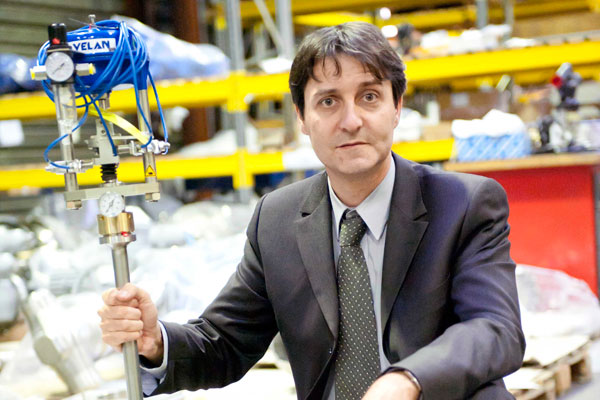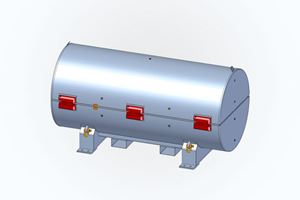Safety and quality are key
Velan’s valves play a critical role in the world’s nuclear power stations. Jean-Luc Mazel, Industrial Director of Velan SAS, the French affiliate of Velan Inc, discusses safety, the aftermath of the Fukushima accident, and the importance of reliable bolt securing in the nuclear industry.
What is Velan’s role in the nuclear industry?
Velan was founded in 1950 by A.K. Velan and started supplying the emerging nuclear industry soon after. It began by supplying valves to the first US nuclear submarine (US Nautilus) and to the Oakridge National Lab. During the 60’s, Velan developed its full range of forged valves and successfully supplied the North American nuclear reactors.
During the 70’s, when the French decided to use PWR (pressurized water reactor) technology for its reactor fleet, Velan decided to localize its production in France in order to supply the French market. Velan S.A.S. was established in 1974 as a joint venture with the French power conglomerate Alstom: in 1999 when it became a 100% subsidiary of Velan Inc. Our company has also inherited of the know-how of other prestigious valve manufacturers such as Sereg, Schlumberger, Bouvier Darling, and Adareg, through successive acquisitions.
Today, Velan supplies classified valves to approximately 350 nuclear reactors around the world and is recognized as a major player in the industry. The company currently employs approximately 2,000 employees in 16 manufacturing plants located in North America, Europe, and Asia. We focus on valves for oil and gas, power (conventional and nuclear), mining, chemical processing, and general services. Velan is largely a family owned company (only 28% of shares are on the stock market in Canada) and is a global and stable valve manufacturer able to serve its many clients worldwide.
Located in Lyon, Velan S.A.S. sells into Europe, Eastern Europe, Russia, and China while our Canadian headquarters, located in Montreal, Quebec (Canada), supplies the North American market through three ‘N’ stamp plants located in Canada and in the USA.
How has Velan become so dominant in the nuclear industry?
The world’s very first nuclear power plants (in the 1950s in US) used Velan valves. So we have a long experience in this industry. This is the first reason. Secondly, we always tried to develop the right products for this very demanding market. Velan has always focused on new technologies, high-quality production, and R&D. The decision to manufacture large, three-dimensional dye forgings for our valve bodies (made in one piece) is the kind of innovation that brings additional reliability and safety to the game and also extends the valves’ service life up to 60 years (particularly important for valves that must ensure the safe operations of nuclear power plants).
We also developed, in co-operation with nuclear operators, our range of modular maintenance valves that make it possible to replace the internal working parts of the valves in less than 15 minutes. This technology helps the nuclear operator save significant time and money during plant operations.
The third reason we have consistently maintained such a large competitive advantage is our focus on product qualifications. Ninety percent of our valves are used inside the nuclear island to cool the reactor, spray water, and control the chemistry of the cooling water. We have performed a large number of tests and reports to qualify such valves during the past 60 years. Velan now owns more than 250 qualification reports certified by independent third parties.
The fourth point is the tremendous amount of operational feedback and expertise we’ve gained over the years. Most of our valves have been operating for 20 to 30 years. We clearly know whether they are good according to our operational experience onsite.
The fifth point is that our company has the appropriate size to deal with large nuclear projects worldwide. Thanks to Velan’s worldwide presence, we can also be a global partner for our clients. We can manufacture locally in any one of our 16 manufacturing plants if needed by the market or if required by our clients.
The last point is that we are a very stable company with a very stable ownership and management team. The company has from day-one been fully committed to the nuclear industry. This helps assure plant operators that we will always be here to supply spare parts and on-site services during the whole life of the plant. We have the ability to establish the kind of long-term partnerships that are essential in this industry.
Why are valves so important for the safety of nuclear reactors?
One nuclear power plant needs around 20,000 valves for the nuclear island and the conventional island. Of these valves, there are approximately 200 large, safety-related valves in the nuclear island, for the most part located in the main primary system and the safety injection system. We supply these valves as well as approximately 4,000 smaller modular maintenance valves (safety classified types) located in the safety systems. We focus on high-quality and highly technical equipment for critical applications.
How has the Fukushima incident impacted on suppliers like Velan?
It is clear that the sudden freeze on much of the new nuclear station projects worldwide right after Fukushima has had a moderate impact on our activity. However, even though we have fewer new projects at the moment, there is a rising demand for safety modifications and spare parts from nuclear operators in existing plants.
Fukushima has also re-oriented the market to an even stronger focus on safety, reliability, and high-quality levels, which is perfectly in-line with our business approach. The nuclear industry has always integrated the feedback from all incidents or accidents. Consequently, the Fukushima’s accident has generated new safety analysis to integrate new severe accident conditions in all countries using nuclear power. The design of the most recent third-generation reactors already takes this point into consideration. In this process, both nuclear engineering and operating companies rely upon well established, proven suppliers to help analyze how to optimize the design of products regarding, for instance, seismic risk.
In addition, our company already survived both the Three Mile Island and Chernobyl accidents, so we already had experience with such cataclysmic events and could anticipate quickly the consequences and re-orientate our strategy accordingly.
Security is top priority in the nuclear industry. What does this mean for bolted joints?
Bolted joints are a key element in the design of our valves. They must secure not only the integrity of the parts under pressure, but also guarantee the performance of motor-operated valves when they are submitted to various loadings. The main parameters to be considered are the fluid running in the systems and the external loads, such as mechanical vibrations or seismic loads. They can be amplified by the design of the systems and by the implementation of supporting devices for piping and valves.
A close cooperation between the valve manufacturer, the plant designer/contractor, and the final operator is a key point for mastering all these parameters. Once all the loads applied on the bolted joint are calculated, it is essential that the stress in the bolted joint be maintained during operation, regardless of what the external loads might be. This underlines the importance of using a reliable solution to ensure the continued locking of the joint over the time.
What benefits does Velan see in products and services from Nord-Lock?
Washers developed by Nord-Lock must ensure perfect locking of the joint over the time and during external loadings and in accident conditions. In order to do so, environmental conditions and parameters of the bolted joint, such as hardness and surface smoothness of the contact parts, must be considered. These parameters are very important and must be taken in account to guarantee the effective operating behavior of the washers. Another key element is being able to control friction and the risk of corrosion of the contact parts over time, both of which can depend upon the type of lubricant used. These joints (washers and bolting assemblies) must also be able to be quickly dismounted without damaging the joint and without increasing the working time of the operators who might occasionally have to work in an environment that contains ionizing radiation. Consequently, the reduction of maintenance time becomes a key safety point that must be considered during the product design phase.
Beyond the performance of this type of washer, it is also important to be able to perform an easy visual examination of the joints during checks on site.
Many customers say that Nord-Lock products are very cost efficient and help them simplify their production. Does this also apply to Velan?
Although keeping costs under control and simplifying production are important factors, safety and quality remain the key words in our business. The safety of the bolted joint is the essential factor that must be kept in mind in the design and optimization of the products with regards to the very stringent requirements of our clients.
If all the stresses are considered early during the design phase for the selection of washers, and provided the design is validated by a qualification test performed in real operating and accidental conditions, it is obvious that the Nord-Lock solution can bring additional safety to nuclear facilities and also reduce maintenance work.

About Jean-Luc Mazel:
Jean-Luc Mazel is the Industrial Director for Velan S.A.S., the French affiliate of Velan Inc. He started his career in 1988 at Velan and has previously been the Engineering Manager of the company. Jean-Luc holds a Master’s degree in mechanical engineering from the Ecole Nationale d’Ingénieur (France). He has considerable experience in the design and manufacturing of valves for heavy-duty applications and in the field of nuclear and cryogenic valves.

